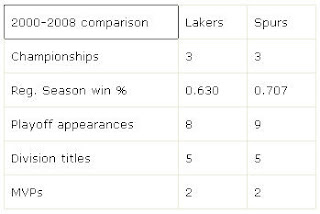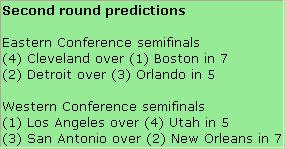Was a Non-Call the Right Call in Lakers-Spurs Game 4?
The Los Angeles Lakers did not trail for a single second of last night’s 93-91 victory over the San Antonio Spurs. Yet all anyone seems to want to talk about are the final 2.1 seconds.
The Spurs inbounded the ball at midcourt to Brent Barry. He gave a head fake, Derek Fisher bought it and jumped into the air, there was contact, Barry dribbled once and fired and off balance three pointer that missed wide right. Game over.
But some people are crying foul. And conspiracy theorists are salivating at the fact that Joey Crawford happens to be the referee in question on that final play. Still, others are taking a more level-headed approach, urging Spurs fans to temper their frustration with a look at the bigger picture.
For what it’s worth, none of the actual participants in the game were willing to say a foul should have been called:
Brent Barry: “That is not going to get called. But the play really didn’t go off as designed and we were forced into a difficult shot at the end that I had but really we weren’t expecting to get that … But that play was not where the game was lost. We gave up so many offensive rebounds and never ever got over the hump.”
Gregg Popovich: “If I was the official I wouldn’t have called that a foul.”
Tim Duncan: “You’re not going to get that call; they’re not going to make that call. I was hoping he (Brent) was going to go up through his arm when he did get him in the air a little bit but I think he took a dribble to the side trying to get a good look at it and he made the right play. He knows they’re not going to make that call and he’s trying to get a good look at the basket and trying to get a clean shot off.”
Derek Fisher: “As he loaded up, I lunged toward him, but before I made contact with him I dropped my arms down and we turned at the same time, so we met simultaneously. There was contact for sure, but I don’t think I ran through him. Had I run through him, I think the ref definitely would have called the foul. I felt like both of my arms were down. I didn’t run through him. I didn’t initiate any contact. I think the ref was able to see that he was turning at the same time that I got to the spot. I think that the fact that both of my arms were down and I was in a relative position of not causing him any harm, that’s why they let it go. I never thought they would call a foul.”
Pau Gasol: “I think I would have been pretty upset if they would have called a foul, especially if there was no foul to call. Luckily, I think, Derek went straight up and down and Barry went into him. It was a good no-call.”
TNT analysts Kenny Smith, Charles Barkley and Reggie Miller compounded the issue by saying the play was not a foul because Barry did not sell the foul. The insinuation was that if he reacted more flamboyantly to the contact or launched himself into Fisher while attempting the three, the call would have been made. And maybe they’re right, but if so, are fans OK with that?
That opens up an entirely separate can of worms that encompasses everything from drawing the foul (generally seen as a good thing) to flopping (generally seen as a bad thing). I think it’s safe to assume fans don’t want a situation that encourages flopping. So then, what do we make of the no-call?
No calls on plays involving contact are nothing new. Often, last-second halfcourt heaves involving some contact are not whistled as fouls. Or, try watching Shaquille O’Neal, LeBron James or Kobe Bryant for an entire game. They will endure contact nearly every time they touch the ball. It’s the only way to keep them from scoring at will. Sometimes the contact will be whistled a foul. Other times, they’ll have to play on, although the contact resembles the same brand that resulted in a foul before. It’s a delicate balance, for sure.
However, short of prohibiting any player contact, which would change the sport entirely, there is no objective way to call a game. Yes, there are rules, yes. And yes, there are detailed descriptions of what constitutes a foul. But fouls are subjective and always will be. They differ from backyard to playground from high school to college and from NBA regular season to postseason. Referees get paid for their spotting-a-foul ability, but they do not have infallibility.
Basketball is a contact sport, plain and simple. That contact is amplified at the end of the game when no one wants to surrender the winning basket, and it’s amplified more at the end of a playoff game when a play can mean the difference between moving on or the end of the season.
The problem is that fans want the game to be decided by the players (i.e. a winner-take-all shot at the buzzer), but players do not want to see their fate decided by the opposing team’s uncontested jumper. Hence, defense, which tends to involve contact of some varying degree. It’s that degree that makes for debate: fair or foul?
And there really is no foolproof solution. It’s subjective. Anyone who’s ever played in a game of pickup basketball knows that disputes over fouls are not limited to the NBA. In streetball, the players call their own fouls, and, I would argue, that is where the idea of the referees not deciding the outcome down the stretch comes from. It takes a serious foul for someone to speak up and call a foul at the end of a closely contested pick-up game. It’s an unwritten rule. You make the play or you don’t. No bail out calls.
That doesn’t make the Barry situation any easier to rule, but it puts the end of game dilemma into context. Let the players play and the referees ref.
Was there contact on the play? Yes.
Enough to justify a foul call? Maybe.
Whose call is that to make? The referee, Joey Crawford.
Did he call a foul? No.
And that’s that. A tough pill to swallow for Spurs fans, certainly, but the referee is there to make a subjective call and he ruled no foul on the play. You can justify it with talk of other calls and non-calls saying it all balances out in the end. That’s fine, but that’s also irrelevant. Each play has to stand on its own.
So unless you’re one of those players at the local Y that calls a foul every time someone breathes on you wrong, take a page from the classy Spurs players, including the player at the center of the storm, Brent Barry. Just because things don’t always go your way, it does not mean the world is against you. Live to play better another day.
No foul. No elaborate conspiracy. No more room for error for the defending champions. Lakers lead the series 3-1.



